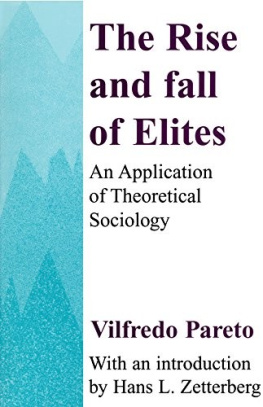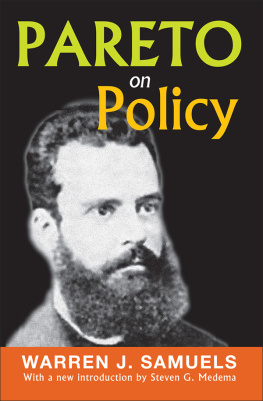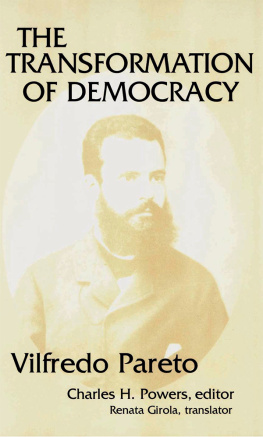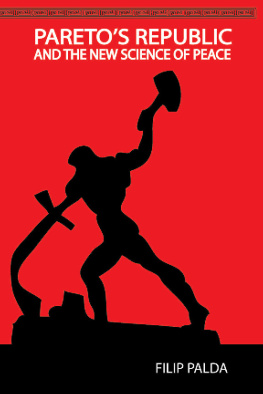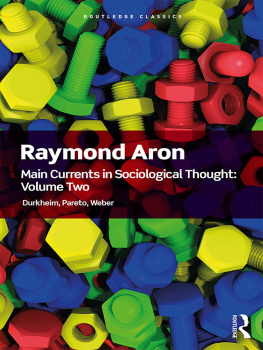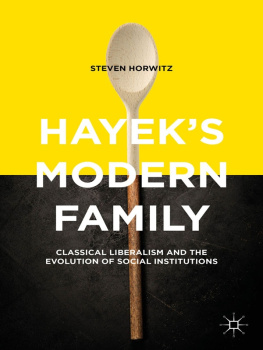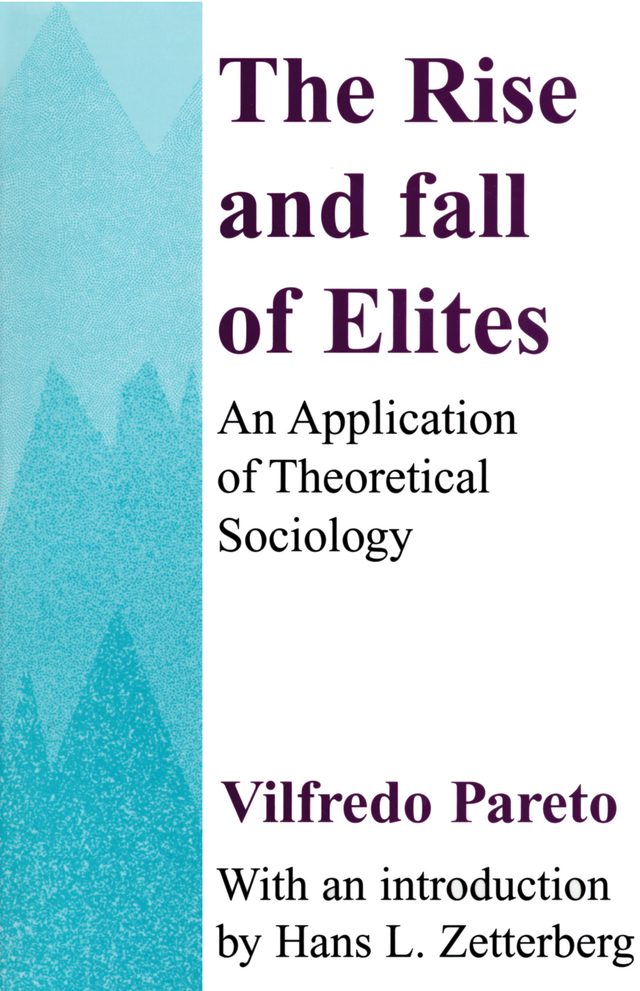
The Rise and Fall of Elites
Social Science Classics
The American Presidency, Laski
Critiques of Research in the Social Sciences, Blumer
Cultural Sciences, Znaniecki
Earth-Hunger and Other Essays, Summer
The Engineers and the Price System, Veblen
An Essay on the History of Civil Society, Ferguson
General Economic History, Weber
The Growth of the Mind, Koffka
Guild Socialism Restated, Cole
Human Nature and the Social Order, Cooley
Human Nature in Politics, Wallas
Jews and Modern Capitalism, Sombart
Myth of the Nation and Vision of Revolution, Talmon
News and the Human Interest Story, Hughes
Outlines of Sociology, Gumplowicz
A Preface to Morals, Lippmann
Progressive Democracy, Croly
The Psychology of Marxian Socialism, de Man
The Psychology of Socialism, Lebon
Recollections, de Tocqueville
The Rise & Fall of Elites, Pareto
Social and Cultural Dynamics, Sorokin
Social Organization, Cooley
The Social Role of the Man of Knowledge, Znaniecki
Society in America, Martineau
The Sociological Eye, Hughes
The Theory of Business Enterprise, Veblen
The Theory of Economic Development, Schumpeter
The Transformation of Democracy, Pareto
Young Germany, Laqueur
An Application of Theoretical Sociology
Vilfredo Pareto
With an Introduction by
Hans L. Zetterberg

Originally published in 1968 by The Bedminster Press Inc.
Published 1991 by Transaction Publishers
Published 2017 by Routledge
2 Park Square, Milton Park, Abingdon, Oxon OX14 4RN
711 Third Avenue, New York, NY 10017, USA
Routledge is an imprint of the Taylor & Francis Group, an informa business
Copyright 1991 by Taylor & Francis.
All rights reserved. No part of this book may be reprinted or reproduced or utilised in any form or by any electronic, mechanical, or other means, now known or hereafter invented, including photocopying and recording, or in any information storage or retrieval system, without permission in writing from the publishers.
Notice:
Product or corporate names may be trademarks or registered trademarks, and are used only for identification and explanation without intent to infringe.
Library of Congress Catalog Number: 90-28083
Library of Congress Cataloging-in-Publication Data
Pareto, Vilfredo, 1848-1923.
[Applicazione di teorie sociologiche. English]
The rise and fall of elites: an application of theoretical sociology/Vil-
fredo Pareto: with an introduction by Hans L. Zetterberg.
p. cm.(Social science classics series)
Translation of Un applicazione di teorie sociologiche, originally pub-
lished in Rivista italiana di sociologia, 1901, p. 402-456.
Reprint, Originally published: Totowa, N.J.:Bedminster Press, 1968.
Includes bibliographical references.
ISBN 0-88738-872-8 (alk. paper)
1. Elite (Social sciences) I. Title
HM141.P28313 1991
305.5'2dc20
90-28083
CIP
ISBN 13: 978-0-88738-872-9 (pbk)
Introduction
Pareto's Theory of the Elites
Socrates: And democracy, I suppose, comes into being when the poor, winning the victory, put to death some of the other party, drive out others, and grant the rest of the citizens an equal share in... offices. Plato, The Republic, Book 7.
The place of Vilfredo Pareto (1848-1923) in the history of science is secured through his contribution to economics. He is one of the pioneers of econometrics. This is an unusually cumulative part of the social sciences so that a person's contribution can be rather precisely ascertained. To remove the theorems that Pareto contributed would be a noticeable loss.
It is, however, Pareto's contribution to sociology (and to some extent political science) that made him known in wider circles. Most of this fame is posthumous. In Italy, at Pareto's death in 1923, a journal founded by Mussolini took pains to point out that, regretfully, Pareto was not a fascist, but that he had contributed much to fascist thinking.
In the United States, in 1936, when one of Pareto's sociological works appeared in translation, he came to enjoy a wave of popularity; for example, Saturday Review gave him a cover and devoted almost a whole issue to his work. But this vogue was soon followed by the wrath of victimage: during World War II he became identified as an ideologist for the enemy.
Although activist-rightist groups often claimed him as their man, Pareto himself was a proud, detached, and ironic man without much desire to align himself with any political movement. His biaswhich is loud and clearis rather against people of all political persuasions who favor social ossification over social change, ascription over achievement, and softness over toughness. A dominant group, in Pareto's opinion, survives only if it provides opportunities for the best persons of other origins to join in its privileges and rewards, and if it does not hesitate to use force to defend these privileges and rewards. Pareto's irony attacks the elite that becomes humanitarian, tenderhearted rather than tough minded. Pareto favors opportunity for all competent members of society to advance into the elite, but he is not motivated by feelings of pity for the underprivileged. To express and spread such humanitarian sentiments merely weakens the elite in the defense of its privileges. Moreover, such humanitarian sentiments would easily be a platform for rallying the opposition. And since Pareto assumes that the opposition, if victorious, would never enact its humanitarian platform, nothing of moral value would be gained by accepting the humanitarian argument.
Pareto obviously thinks of himself as a sophisticated visitor to the theater of historical drama who early discovers the entire plot while the rest of the audience still is misled by dramatic gestures, moralistic speeches, and the comings and goings of the actors. Pareto took pride in his superior sophistication in this respect, and he sees no reason to hide it. Many readers are apt to be annoyed with him for being so smugly sure.
Pareto concentrates his attention on existing and potential elites, and has rather little to say about other parts of society. While his own elitist sentiments might have played a part in this choice of topic, he also has other justifications for his special attention to the top segments of society. He has noted that social change, at least in the sense of replacement of persons and reorganization of positions, is a great deal faster in higher strata than in lower strata, except perhaps in the very lowest stratum of itinerant workers. He is also convinced that events and decisions among the elites have more consequences for the history of a society than events and decisions among its great masses. The very fact that critics of his viewpoint treat the masses either as breeding places for revolutions, that is for new elites, or as factors contributing Inertia or stability to society, proves to Pareto that the study of historical change very largely revolves around the study of elites.
The propositions constituting Pareto's theory of the circulation of the elites are found mainly in three sources, all written when Pareto was over fifty years of age:
A monograph entitled "Un applicazione di teorie sociologiche" (Rivista Italiana di Sociologia, 1901, pp. 402-456), which provides the shortest and most readable introduction to his theory of the circulation of the elites. It is now belatedly reaching print in English under the title The Rise and Fall of the Elites: An Application of Theoretical Sociology.
Next page
